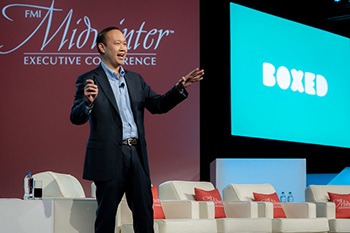<p>By Leslie Sarasin, President and CEO, FMI<br />
<img src=”https://www.fmi.org/images/default-source/blog-images/boxed_2.tmb-large-350-.jpg?sfvrsn=6a701745_1″ data-displaymode=”Thumbnail” alt=”boxed_2″ title=”boxed_2″ style=”float: right; margin: 10px;” /></p>
<p><a href=”http://www.fmi.org/midwinter”>FMI Midwinter Executive Conference</a> Chairman and Co-Founder and CEO of <a href=”https://www.boxed.com/”>Boxed.com</a>, Chieh Huang, has a storied career starting his wholesale technology platform after a successful background in both law and tech. Before he takes the stage at our signature event later this month, Chieh addressed a few of my initial questions regarding his observations on supply chain and tech – and how FMI members’ consumer-facing businesses have fundamentally changed. </p>
<h5>On Supply Chain</h5>
<p><strong>Leslie:</strong> Two-part question: What are the most significant lessons you learned and put into practice when faced with the confluence of supply chain challenges over the last 23 months – materials and ingredients; labor; equipment; transportation and trucking; capacity; inventory control; cost pressures; and weather-related events? What strategic steps did you take early on that have helped your team meet demand?<br />
<br />
<strong>Chieh:</strong> What a crazy two years it’s been for the entire industry! The single most important lesson is that the strongest chains are actually flexible – being able to react and be nimble was incredibly important and will continue to be so in the coming years.</p>
<p><strong>Leslie:</strong> What advice would you have for a new food supply chain professional on maintaining business continuity during a crisis?<br />
<br />
<strong>Chieh:</strong> The bad thing is everything has changed. The good thing is everything has changed.</p>
<p><strong>Leslie:</strong> As a retailer, how did you communicate these challenges to your shoppers?<br />
<br />
<strong>Chieh:</strong> We definitely made sure we were as transparent as we could be with our shoppers – whether it was badging on individual items, or banners on the homepage. We also made sure to let shoppers know when a hot item was fully in stock, which led to a bit less panic buying on the site.</p>
<p><strong>Leslie:</strong> With everything you and your business faced during the pandemic, what do you attribute to your resolve in reaching IPO status?<br />
<br />
<strong>Chieh:</strong> I really think the pandemic made digital a “need to have” — not a “nice to have” anymore. That realization from operators, shoppers and Wall Street made for a good environment for us to have our moment.</p>
<h5>On Technology</h5>
<p><strong>Leslie:</strong> If you had a crystal ball, what would you say is next in technology for the digital grocery experience? <br />
<br />
<strong>Chieh:</strong> I really think the next big thing will actually be quite simple. It will be to 100% nail the customer experience. Because of data, inventory and other UX challenges, buying groceries online and getting it delivered whenever, however and to whomever you want is not as seamless as it is in other industries.</p>
<p><strong>Leslie:</strong> Consumers’ online grocery shopping behaviors changed dramatically in 2018, when the online channel represented 1% of the grocery. In 2019, it captured 2% of the food dollar; 2020 saw it double; and 2021 is seeing its continued growth at 6%. Which of these behaviors do you believe will remain, and which do you see returning to pre-pandemic patterns? <br />
<br />
<strong>Chieh:</strong> I think the stock-up behavior will remain. All the people who thought some of their grandparents’ habits were crazy (me included) probably don’t think so anymore; we’ve all gone through a worldwide crisis and that memory of scarcity will not be forgotten quickly.</p>
<p>In his address at <a href=”http://www.fmi.org/midwinter”>FMI Midwinter Executive Conference</a> on March 29, Chieh will explore the many ways in which the food retail business and consumer buying patterns have changed forever and how he’s thinking about the future.</p>
<p><a href=”https://www.fmi.org/midwinter-conference” class=”button”>Learn More</a></p>
Mar 8, 2022
By Leslie Sarasin, President and CEO, FMI
FMI Midwinter Executive Conference Chairman and Co-Founder and CEO of Boxed.com, Chieh Huang, has a storied career starting his wholesale technology platform after a successful background in both law and tech. Before he takes the stage at our signature event later this month, Chieh addressed a few of my initial questions regarding his observations on supply chain and tech – and how FMI members’ consumer-facing businesses have fundamentally changed.
On Supply Chain
Leslie: Two-part question: What are the most significant lessons you learned and put into practice when faced with the confluence of supply chain challenges over the last 23 months – materials and ingredients; labor; equipment; transportation and trucking; capacity; inventory control; cost pressures; and weather-related events? What strategic steps did you take early on that have helped your team meet demand?
Chieh: What a crazy two years it’s been for the entire industry! The single most important lesson is that the strongest chains are actually flexible – being able to react and be nimble was incredibly important and will continue to be so in the coming years.
Leslie: What advice would you have for a new food supply chain professional on maintaining business continuity during a crisis?
Chieh: The bad thing is everything has changed. The good thing is everything has changed.
Leslie: As a retailer, how did you communicate these challenges to your shoppers?
Chieh: We definitely made sure we were as transparent as we could be with our shoppers – whether it was badging on individual items, or banners on the homepage. We also made sure to let shoppers know when a hot item was fully in stock, which led to a bit less panic buying on the site.
Leslie: With everything you and your business faced during the pandemic, what do you attribute to your resolve in reaching IPO status?
Chieh: I really think the pandemic made digital a “need to have” — not a “nice to have” anymore. That realization from operators, shoppers and Wall Street made for a good environment for us to have our moment.
On Technology
Leslie: If you had a crystal ball, what would you say is next in technology for the digital grocery experience?
Chieh: I really think the next big thing will actually be quite simple. It will be to 100% nail the customer experience. Because of data, inventory and other UX challenges, buying groceries online and getting it delivered whenever, however and to whomever you want is not as seamless as it is in other industries.
Leslie: Consumers’ online grocery shopping behaviors changed dramatically in 2018, when the online channel represented 1% of the grocery. In 2019, it captured 2% of the food dollar; 2020 saw it double; and 2021 is seeing its continued growth at 6%. Which of these behaviors do you believe will remain, and which do you see returning to pre-pandemic patterns?
Chieh: I think the stock-up behavior will remain. All the people who thought some of their grandparents’ habits were crazy (me included) probably don’t think so anymore; we’ve all gone through a worldwide crisis and that memory of scarcity will not be forgotten quickly.
In his address at FMI Midwinter Executive Conference on March 29, Chieh will explore the many ways in which the food retail business and consumer buying patterns have changed forever and how he’s thinking about the future.





